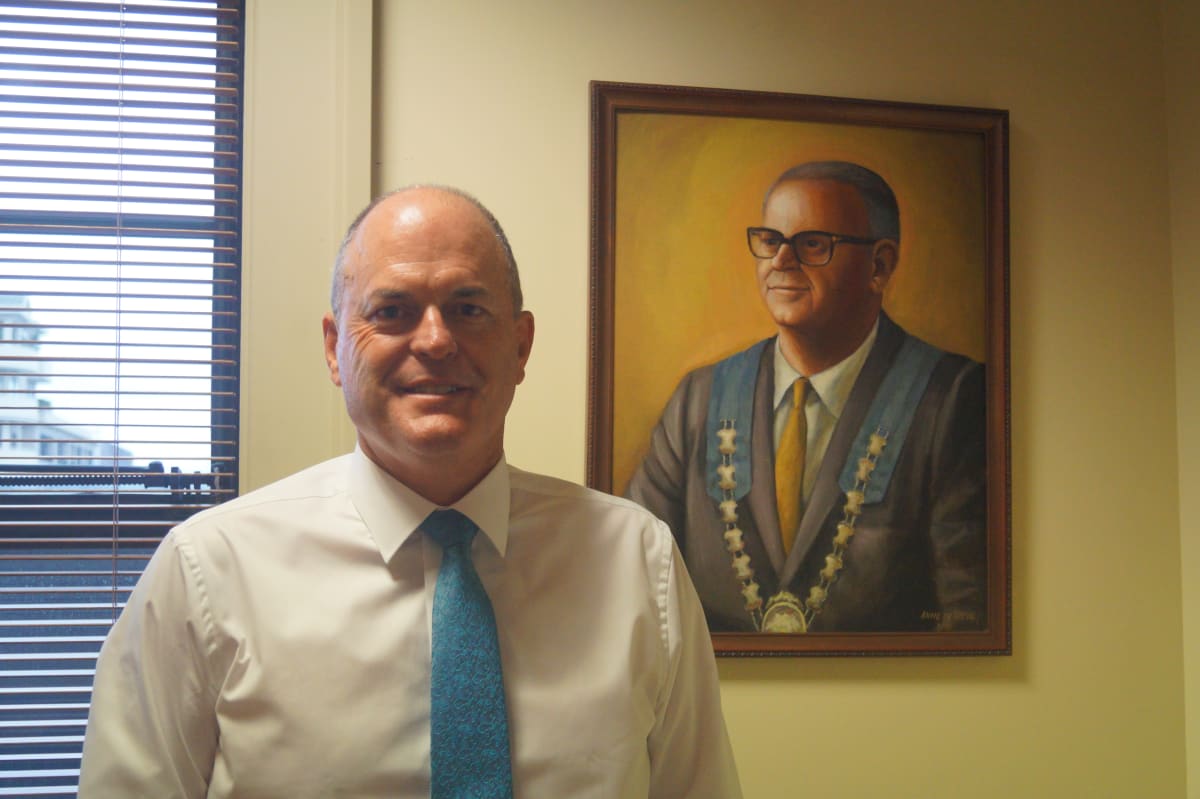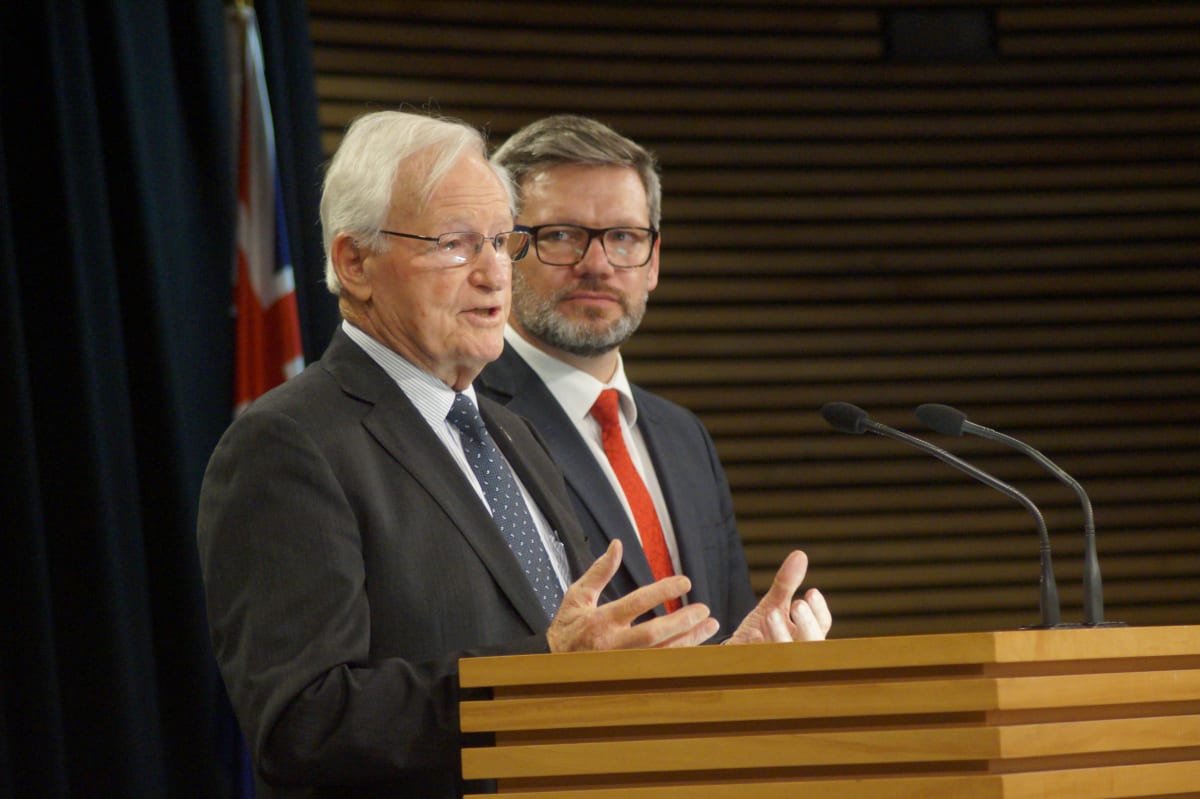Todd Muller has taken on the almost impossible job of toppling an immensely popular prime minister at a time of global crisis. The new National leader spoke to Sam Sachdeva about the task ahead, what he learned from corporate life, and whether his party is failing to properly represent New Zealand’s diversity.
After orchestrating a leadership coup to take on what many label the worst job in politics, interior decor is probably low on the to-do list.
So it is little surprise that new National leader Todd Muller’s equally new offices are not entirely pristine, with a cardboard box bearing the name of his deposed predecessor Simon Bridges sitting on the ground in the reception area.
There are a few personal touches, though.
A portrait of Te Aroha Mayor Henry Skidmore, Muller’s grandfather and mentor, has made it onto the wall, but conspicuous by its absence is the Make America Great Again cap which sparked the new National leader’s first mini-scandal.
Muller had initially pledged to keep the piece of Donald Trump memorabilia on display in his new office, only to reverse his position and keep it in storage.
But he has picked up a new political keepsake from a man some have described as New Zealand’s answer to Trump.
While Newsroom is waiting to speak to Muller, one of Winston Peters’ senior staffers drops off a mysterious office-warming present in a brown paper bag. It’s later confirmed to be a ‘New Zealand Made’ trucker cap – both a Winstonian dig at the MAGA scandal, and fuel for the idea New Zealand First may be more willing to work with National now Bridges is out of the picture.

But Muller is a long way from making it to the table with Peters, with a little over three months to lift his party from its miserable 30 percent showing in the polls.
Perhaps smartly, he declines to put a number on where he would like National to be in the coming weeks, but insists a return to power is within reach, as improbable as it seems.
“We had a good caucus today in that regard, because there’s no time for anything else. We’ve got 14 weeks, we’ve got to all bring the best of our abilities, tremendous as they are, to this cause, and come up with a suite of policies that resonate for New Zealand.”
Those policies seem certain to focus on the economy, and particularly the financial response to the Covid-19 pandemic: among Muller’s key early moves has been persuading Amy Adams to put her retirement plans on hold and take on the Covid-19 recovery portfolio, overseeing a fast-paced review of the party’s policies before the election.
Given Bridges had also emphasised the economy in his attacks on the Government, it appears the problem for National MPs who backed the leadership change was not so much the message but the messenger.
Muller concedes his policy priorities are broadly similar, but says he will put his own stamp on National’s agenda, as evidenced by Adams developing a plan for a whole-of-government response to the pandemic.
“My criticism of this Government is it feels disconnected and sporadic: ‘Now, you have $50 million for racing and you have this’. It feels like a hodge-podge response as opposed to a strategic coherent response, particularly in terms of a recovery.”
“When I was sitting on the Fonterra leadership team, you know, a $22 billion company, that was the same sense of having your mouth over a fire hydrant.”
Revamping the party’s policies while also trying to introduce himself to the electorate – all as he goes up against one of the most popular prime ministers in modern history – is a daunting task, but Muller believes his time in the corporate world has prepared him well.
“When I was sitting on the Fonterra leadership team, you know, a $22 billion company, that was the same sense of having your mouth over a fire hydrant.”
He was at the dairy giant in 2013, when a botulism scare related to infant formula forced a mass recall of Fonterra products and threatened New Zealand’s access to the Chinese market.
While it ultimately turned out to be a false alarm, Muller describes the period as “terrifying”, before correcting himself: “Horrifying is probably a better word, because it’s possible that product could have ended up in the supply chain – or had ended up in the supply chain.”
While Muller was part of the “war room” overseeing the senior-level response, he says the saga taught him to better appreciate and support the work of those further down the chain.
“There was this core of people that were working 20 hours a day, sort of two or three levels down in the business of Fonterra, who reported through to me and I walked into that room sort of two weeks later, and those people were completely shattered.
“And I’d realised that I hadn’t sufficiently made myself aware of the scale of involvement of the business to this, and there were people there that had deserved my support that hadn’t caught up.”

But Muller did have political experience before becoming an MP, working as a staffer for Prime Minister Jim Bolger for several years in the 1990s.
Bolger endorsed Muller’s leadership credentials, via an RNZ interview, before his hat was formally in the ring. His former employee returns the favour when asked what he learned from his boss, praising his deep interest in the life stories of others and desire to look at the bigger picture.
“He’s really strong on climate change, he’s really strong on the future of work and that sort of thing. He’s mid-80s, but he still reads a lot and thinks a lot about what the New Zealand of the next 10, 15 years should look like, and I have a natural interest in that sort of thing as well.”
Muller’s previous work as National’s climate change spokesman has put him at odds with the party’s base, including a rough reception at the party’s 2019 conference.
He worked with Climate Change Minister James Shaw to secure bipartisan support for the Zero Carbon Bill, and says New Zealand’s economy must evolve to reduce emissions.
“I’m very strong and have been in the time that I’ve been in Parliament that [climate change] is not something we duck, this is not something we defer.”
Where he and Shaw differ, however, is on how to get there: Shaw prefers “pricing the signal [via emission costs] so acutely that it forces people to make choices”, while he focuses on what emissions-reducing technology will become available in the near future to help sectors like agriculture.
Focusing on pricing before uncertain technological advances is “in its own way an economically rational approach”, but only if every country follows suit.
“If only we do it and everybody else subsidises the ag sector, I get a little jaundiced in my view that if we’re not careful, we create a competitive disadvantage for us as opposed to the other way.
“But I’m very strong and have been in the time that I’ve been in Parliament that this is not something we duck, this is not something we defer,” he concludes.
But there was a sense among some within National that Muller had spent too long deferring his run for Parliament and the party’s higher ranks.
Better late than never
Writing for Pundit, former National Party staffer Hamish Price said Muller had been “a confirmed member of the Could-Have-Beens”, turning down several invitations to contest seat selections.
“Over the years many those who have known Muller and recognised his leadership material came to write him off,” Price wrote.
“He had bottled his chance to succeed early, they said. He didn’t have the hunger, they said. He had missed his opportunity, they said.”
Now, Muller has proved them wrong – but why didn’t he make the move to Parliament earlier?
“I mean, I thought it was early at 45,” he quips, adding that he viewed his move into the commercial sector as a prerequisite for an effective political career.
“There are others both on our side and their side that have a different route to Parliament: some never leave, they come here as staffers and the sort of professionalisation of politics and politicians…
“I’m not going to criticise it, but it’s not particularly my way. I think we’re better as a Parliament when we’re more diverse and we bring a whole lot of different lived experiences to it, [rather than] have too many of us come from a single sort of perspective.”
Missing Māori
But it is the lack of diversity amongst his new front bench – specifically, the lack of Māori MPs – that has put Muller on the back foot early on.
The debate was compounded by Muller’s deputy Nikki Kaye claiming finance spokesman Paul Goldsmith as a Māori frontbencher – only for Goldsmith himself to state that, while his great-great-grandfather had had a number of Ngāti Porou wives, he did not himself identify as Māori.
With an air of resignation, Muller acknowledges he and Kaye have to own that mistake, but he pushes back against the idea the slip-up is symbolic of any broader failures.
“I have a caucus of 55 and remarkable diversity and talent, and my job is to share the portfolios across the 55.”
Where some leaders would leave the heavy lifting to those towards the top of the rankings, he and Adams made a point of spreading significant portfolios across the entire caucus.
“You have people like [Northcote MP] Dan Bidois, who’s brand new, in his second or third year, a remarkably talented individual, Māori, and I gave him workplace relations.
“Now, that in itself is a story, right, because I took what has historically been a front bench job and given it to him, but it didn’t get interpreted like that, because people said, ‘Oh, but who have you got in your top 12?’ ”
“The National Party focus on creating the conditions for people to be employed and people to move into full employment and to maximise the potential which is sort of my philosophy that, you know your potential and can realise that over the course of your life, that is where we’re going to put our focus.”
Muller says he will be keeping a close eye on his caucus in the next three months, with the best performers able to elevate themselves into a spot in Cabinet should National win the election.
But what would Muller, who spoke of his childhood as “the only Pākehā boy in a Māori convent”, do to help Māori and Pasifika communities?
The answer is light on specifics and strong on conservative tropes, as has been the case for many policy issues (perhaps to be expected given he is still in his first week as leader).
“Because they are communities that are often most represented in the challenging statistics of this country, they’re the communities that will feel the impact of Covid-19 in an economic context, disproportionately, so it’s the same question around how then, what is the best mix of economic policy and social policy to be able to affect genuine change for those communities?
“And I’ve always felt that the National Party focus on creating the conditions for people to be employed and people to move into full employment and to maximise the potential which is sort of my philosophy that, you know your potential and can realise that over the course of your life, that is where we’re going to put our focus.”
Whether Muller can fill in those gaps, with the help of Kaye, Adams and others, will determine whether his snatching of the leadership was a fool’s errand or something more significant.



